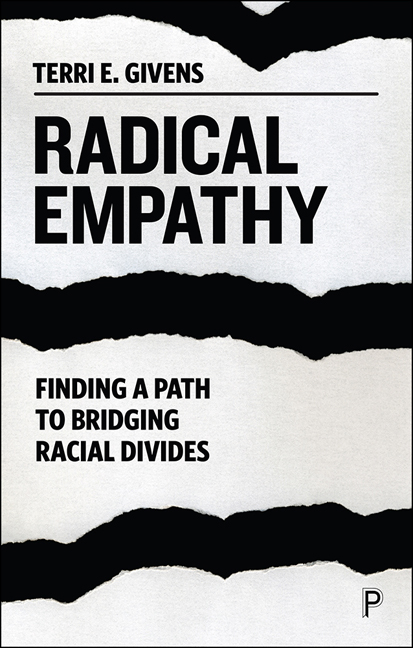Book contents
- Frontmatter
- Dedication
- Contents
- Note on the author
- Prologue:Writing in a time of crisis
- 1 Bridging divides: From racism to empathy in the 21st century
- 2 Getting to radical empathy
- 3 My family’s story: The isolation of internalized oppression
- 4 Racism and health disparities
- 5 Finding empathy in the academy
- 6 Love and marriage
- 7 Radical empathy in leadership: Creating change
- 8 Creating change at the national level: Restorative justice and working off the past
- 9 Revisiting the path to radical empathy
- Epilogue: The long road ahead
- Notes
- Suggested reading
- Index
Epilogue: The long road ahead
Published online by Cambridge University Press: 05 January 2022
- Frontmatter
- Dedication
- Contents
- Note on the author
- Prologue:Writing in a time of crisis
- 1 Bridging divides: From racism to empathy in the 21st century
- 2 Getting to radical empathy
- 3 My family’s story: The isolation of internalized oppression
- 4 Racism and health disparities
- 5 Finding empathy in the academy
- 6 Love and marriage
- 7 Radical empathy in leadership: Creating change
- 8 Creating change at the national level: Restorative justice and working off the past
- 9 Revisiting the path to radical empathy
- Epilogue: The long road ahead
- Notes
- Suggested reading
- Index
Summary
As I write this on November 12, 2020, my shoulders still ache from the tension I felt over the past week. It has only been 6 days since Joe Biden and Kamala Harris were projected to become our new president and vice-president. It was a tense week as we watched ballots being counted in the states of Pennsylvania, Georgia, and Arizona. I was thrilled on Saturday when the announcement was finally made—Biden and Harris had won. We had friends over for champagne (with masks on), celebrating the fact that we would have a president who was already calling for unity, and the first African-American, Asian-American, woman vice-president. The good news is that 79 million voters chose a new path for our country. The bad news is that over 73 million Americans voted to give Donald Trump a second term. We remain a divided country.
As I reflect on the upheaval and chaos we have experienced in the last four years of the Trump presidency, I worry, knowing that he will remain a potent force in the politics of our country for the foreseeable future. I never imagined four years ago that we would be facing a dangerous pandemic and an economic disaster, as well as the anti-racist Black Lives Matter movement that would so deeply impact our lives. Trump's divisiveness, particularly during the election campaign, left many feeling fearful, whether they supported him or not. His unwillingness to set an example by wearing a mask, even after contracting the virus himself, has likely played into the increasing numbers of COVID-19 across the US.
Winter is approaching and the numbers of people testing positive for COVID-19 in the US and Europe are increasing. Our long quarantine continues. I am hopeful, however, that the message for empathy is gaining traction. I have had many people reach out to learn more about my work, and I am working with several companies and schools as they try to bridge divides in their communities.
It is unfortunate that some political elites have chosen the politics of division, even as our country becomes more diverse. The demographic changes in our country are inevitable, but we must convince people from all backgrounds that we can be better by working together. There is a long history behind the divisions in our societies, and I explore that further in my next project, The Roots of Racism.
- Type
- Chapter
- Information
- Radical EmpathyFinding a Path to Bridging Racial Divides, pp. 155 - 156Publisher: Bristol University PressPrint publication year: 2021

